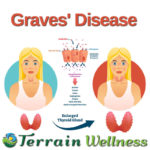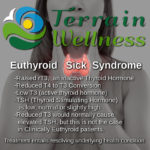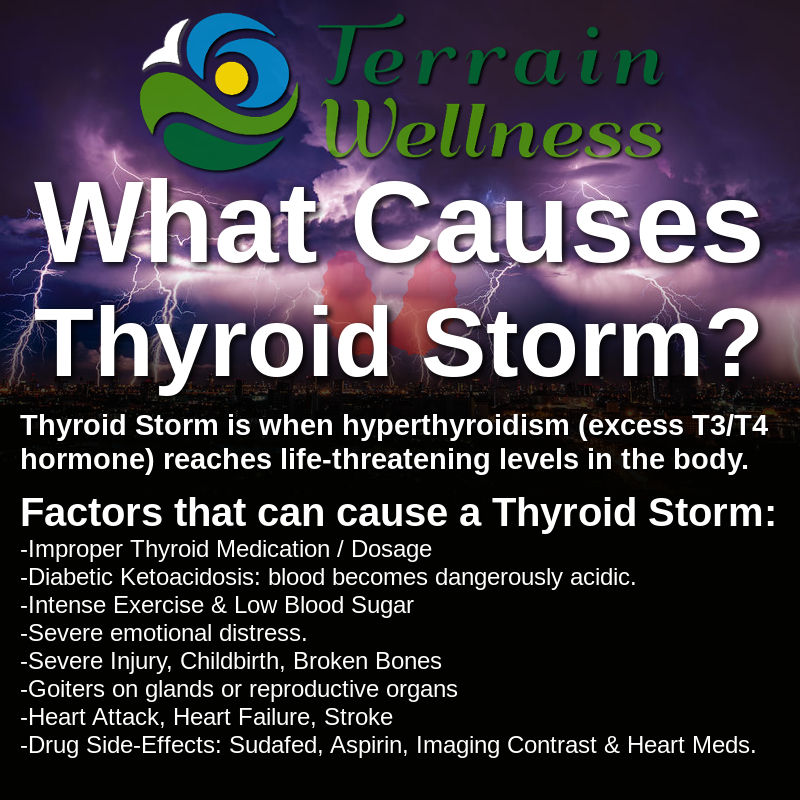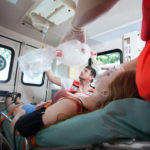Thyroid Storm

Thyroid Storm, aka thyrotoxic crisis, is a medical emergency requiring immediate medical care. This article is for educational and entertainment purposes only. While every effort is made to be factually accurate, there may be errors or omissions. This article is not medical advice and is not intended to diagnose, treat or cure any disease. If you think you are having a medical emergency, call 911.
-
Contents:
- Symptoms of a Thyrotoxic Crisis
- Graves’ Disease
- What Causes a Thyroid Storm?
- What To Do in a Thyrotoxic Crisis
- Treatment: Hospitalization
- Conclusion: Prevention is Best
Racing heart rate, profuse sweating, fever, nausea, vomiting, dizziness, diarhea, agitation, confusion and restlessness are some of the common symptoms of a rare, life-threatening health condition called a Thyroid Storm or thyrotoxic crisis. This condition occurs when hyperthyroidism (excessive T3/T4 hormone levels) runs out of control and the body is inundated by much more T3/T4 than it needs. When compared to common hyperthyroidism, the onset of symptoms in a thyrotoxic crisis are defined as sudden and severe.

The surge in hormones causes the body’s metabolic processes to be accelerated far beyond safe and healthy limits. Left untreated, a thyrotoxic crisis can result in heart failure, heart attack and death. For this reason, if you think you’re having a thyroid storm, call 911 and get to an emergency room immediately.
Causes, Symptoms & Treatment
- Symptoms of hyperthyroidism, but at a sudden and severe level.
- High Fever
- High Blood Pressure. FYI, blood pressure may fall dangerously low later on when the cardiovascular system begins to fail from being pushed too far.
- Tachycardia (racing heart rate) that can be so severe it leads to heart failure or heart attack
- Increased Respiration (can bring about Respiratory Failure)
- Fine muscle shaking, tremors
- Confusion, nausea or vomiting that can progress to seizures, delirium and coma
- Diarrhea (T3/T4 speed up all metabolic processes, including digestion)
- Severe agitation or anxiety that may give way to apathy/depression in some atypical cases. See Apathetic Thyrotoxicosis
Thyroid Storm Symptoms
Thyrotoxic crisis is usually a complication of hyperthyroidism, a condition where the body produces too much T3/T4 thyroid hormone (Triiodothyronine & tetraiodothyronine). The most common cause of thyroid storm occurs when a person who already has hyperthyroidism experiences one or more events that trigger the full-blown crisis. You might think of these events like the proverbial “straw that broke the camel’s back” in terms of our thyroid health. Precipitating factors that trigger the thyrotoxic crisis may include things like serious injury, trauma, severe infection, emotional stress, complications from surgery, medication side-effects and intense exercise. If severe enough, it may be possible for one of these events to bring on a severe hormonal imbalance such as a thyrotoxic crisis or other conditions such as Euthyroid Sick Syndrome.
At times, Graves’ Disease patients who get surgery to have all or part of their thyroid removed can fall into thyrotoxic crisis because the trauma to the gland causes dangerous levels of hormones to be released all at once. Likewise, antithyroid treatments like radioactive iodine that kill off the thyroid gland can result in a life-threatening hormone release as the tissues that make up the gland die off and spill out their contents in an uncontrolled manner (see: Oxford Medical Radioactive Iodine Therapy & Graves’ Disease). As bad as the above adverse reactions are, even when these treatments work as intended, the patient is left dependent on hormone replacement medications to live. What many fail to realize in all of this, is that radioactive iodine and/or surgically removing the gland does nothing to unravel the underlying autoimmune processes that led to the problem in the first place.
- Hyperthyroidism that is undiagnosed, untreated, undertreated
- Improper Thyroid Medication / Dosage
- Diabetic Ketoacidosis (a life-threatening condition where the body breaks down fats into ketones too rapidly, resulting in the blood becoming acidic)
- Hypoglycemia (low blood sugar)
- Intense Exercise, Severe Physical Exertion
- Trauma: Childbirth, broken bones or other severe injury
- Goiters on glands or reproductive organs
- Pregnancy Complications
- Heart Attack, Heart Failure, Pulmonary Embolism
- Stroke
- Medication Side-Effect (Pseudoephedrine, Aspirin-Related Products & some Heart Medications)
- Intense Emotional Stress
- Imaging Contrast Iodine Solutions
Causes & Contributing Factors:
The number one underlying factor that leaves one vulnerable to thyrotoxic crisis is your body being in a state of hyperthyroidism. In turn, the most common cause of hyperthyroidism is Graves’ Disease, which is an autoimmune condition that causes the body to overproduce T3/T4. While genetics as well as simple bad luck are often blamed for Graves’ Disease, the medical research shows that autoimmune thyroid conditions are strongly correlated with reactivated Epstein-Barr Virus (EBV), chronic inflammation, poor gut health, unhealthy food and harmful blood sugar fluctuations (PubMed: EBV linked to thyroid Problems). The point I want to stress is that there are a number of preventable health conditions that leave the body vulnerable to hormone imbalance. When I work with patients with Graves’ Disease, Hashimoto’s Thyroiditis and other autoimmune conditions, one of my main clinical goals is to resolve as many of the health problems that amplify autoimmune processes as possible. In this way, we achieve far better patient outcomes than if we just followed the minimum standard of care. In my clinical experience, the disease progression goes as follows: Underlying Conditions -> Autoimmune Condition -> Thyroid Dysfunction.
To be clear, a thyrotoxic crisis is a medical emergency that requires emergency care in a hospital. Myself, my clinic and my staff are not equipped to treat this life-threatening situation. That said, we do treat autoimmune hyperthyroidism patients in a non-emergency setting. By going above and beyond the normal standard of thyroid care, we achieve exceptional results with our patients. No matter which doctor you choose, make sure they’re experienced in natural, functional medicine and that they will work with you to alleviate the underlying health conditions that damage our endocrine systems.
Also see: thyroid hair loss.
What do I do if I’m having a Thyroid Storm?
The treatment for a thyrotoxic crisis is to get out your cellphone, call 911 and seek immediate, emergency medical care. Again, I must stress that these suggestions should not be construed as medical advice. These suggestions are meant for entertainment and general educational purposes only and may be incomplete or contain errors. While you wait for the ambulance, consider unlocking the front door so that paramedics can get in more easily if you lose consciousness. If you are able and after you have sat down, consider writing a list of medications you take and any allergies or health conditions you have, including pregnancy as this can affect thyroid storm treatment. Practice box-breathing, where you take a slow breath in expanding through your stomach, not your chest, hold for a few seconds and then slowly exhale (and repeat). Deep breathing may help slow down your racing heart rate and ease your anxiety a little while you wait for emergency crews to arrive.
One of the other dangerous symptoms associated with a thyrotoxic crisis is high fever and profuse sweating as the body does everything it can to keep from overheating. Consider using a cool, moist washcloth on your forehead, have someone get you a fan and avoid heat while you wait for an ambulance to arrive.
Since this type of emergency carries the risk of heart attack, heart failure and shock, calming your body by limiting your external stimuli is often recommended. Background noise like the television, radio, social media notifications or people talking loudly can add to the stress and are not recommended. Do not take any medication, supplement, or drug unless it has been prescribed by your doctor and/or administered by a healthcare professional. This includes no alcohol, no caffeine and no iodine-containing foods or substances (unless instructed by your physician).
If there are people with you, instruct them to speak softly, remain calm and to help you to relax as possible given the circumstances. Loved-ones’ emotions could likely run high given the stress of the situation, but remind them that you need them to keep a clear head and be calm under pressure so they can help you get the medical care you need. Thyroid Storm, aka thyrotoxic crisis, is a medical emergency requiring immediate medical care. This article is for educational and entertainment purposes only. While every effort is made to be factually accurate, there may be errors or omissions. This article is not medical advice and is not intended to diagnose, treat or cure any disease. If you think you are having a medical emergency, call 911.
Thyroid Storm Treatment
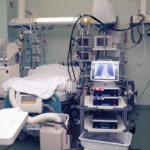
Thyroid storm treatment is administered in a critical-care hospital setting and cannot be performed in a clinic or at-home. In the hospital, a highly trained team of doctors and nurses in the ICU (Intensive Care Unit) will closely monitor your heart rate, temperature, blood sugar, respiratory rate and hormone levels. While we routinely treat non-emergency hyperthyroidism patients, as an out-patient clinic and wellness center, my clinic, Terrain Wellness is not equipped to treat emergencies. If and when such a situation arises, we will call an ambulance and have the patient transported to the nearest hospital emergency department.
At the hospital, a team of highly trained doctors, nurses and technicians will work around the clock, doing everything in their power to save your life. As a doctor practicing natural and functional medicine, I do have my differences when it comes to the hospital system. However, one thing hospitals excel at is immediate life-saving techniques that are crucial in emergency situations such as severe injuries or thyrotoxic crisis etc.
Your doctors and nurses will have two main objectives, each aimed at saving your life. The first is to limit the life-threatening damage that symptoms like racing heart rate, high fever can cause. The second, is to lower your T3/T4 levels back to a healthy range without pushing your body too far the other direction into severe hypothyroidism. The healthcare team may administer a number of drugs to control symptoms like fever, agitation/anxiety, blood pressure, heart rate and other metabolic processes. Doctors may also prescribe emergency antithyroid treatments that may include surgery (thyroidectomy) or medications like Tapazole (unless in 1st trimester of pregnancy) or propylthiouracil (can interfere with liver function).
This video provides an Emergency Room / Intensive Care Unit Nurse’s perspective treatment philosophy (the ideas, views and opinions of the speaker are hers alone, and do not necessarily reflect those of myself or Terrain Wellness).
Conclusion: Prevention is the best thyroid storm treatment
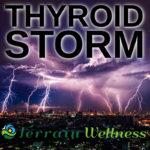
At this point, the readers should be well aware that thyrotoxic crisis is life-threatening and requires emergency hospitalization. The best treatment is prevention through proper medication management while going above and beyond the normal standard of care to resolve the underlying factors that exacerbate and provoke hyperthyroidism. The medical research closely links autoimmune conditions to thyroid disruption. But, it doesn’t stop there, because the research also links underlying conditions like poor gut health, reactivated EBV, chronic stress and high-inflammatory foods to autoimmune conditions.
In my clinical experience, the disease progression goes as follows: Underlying Conditions -> Autoimmune Condition -> Thyroid Dysfunction. With this in mind, if we as doctors want to truly make a lasting, systemic change in our patients’ health, we need to dismantle the entire autoimmune cycle in the body.
Yours in health,
Dr. Danielle Lockwood

